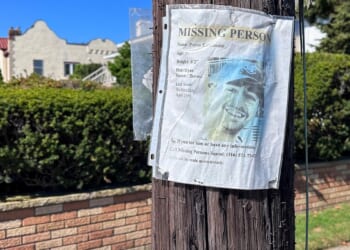
Is committing identity theft and making the life of a man and his family hell a bad thing?
Apparently not, as long as you were also breaking the law by entering the country illegally and working illegally, racking up debts without paying them, and committing other crimes. In fact, once you are caught, the Times will classify you as a victim in need of as much sympathy as the man you have terrorized for a decade.
At least, that is the take of the geniuses at The New York Times.
Hope the Bishops who signed the letter against immigration enforcement read this article. Two Men—an American citizen and an illegal immigrant. One Identity. The American citizen gets screwed over for 20 years due to lack of immigration enforcement. Illegal immigrant commits…
— Mark Davis (@davis_kertwang) November 23, 2025
The Times profiles the two men in question. The two victims, as they call them.
Dan Kluver saw the police lights flashing in his rearview mirror late last year and eased his car onto the shoulder, thinking there had been some kind of mistake. He had spent four decades in rural Minnesota without ever getting into trouble. He prided himself on a life built around dependability and routine, working at the same factory where his father once did and spending his weekends coaching baseball and teaching Sunday school. He had never fired a gun, or smoked a cigarette, or missed a payment, or been arrested.
“License and registration, please,” the officer said. Kluver, 42, handed them over and waited while the officer went back to his patrol car. He listened to the church bells that rang every hour and watched sunlight reflect off the grain silos in downtown Olivia, where he knew most of the 2,400 residents, including the officer who was walking back to his car.
“Is everything all right?” Kluver asked.
“It’s strange, but it looks like your license has been suspended,” the officer said. “You’ve got another driver’s license with some issues down in Missouri.”
“What?” Kluver said. “I’ve barely ever been to Missouri. How’s that possible?”
The officer had no answers, but Kluver feared he might know what was happening. Over the years, there had been signs that something wasn’t right — stray letters about wages earned in unfamiliar towns and collection notices for debt that wasn’t his. Kluver had tried to untangle the mess several times by hiring tax specialists and driving to government offices across the state only to run into the same bureaucratic dead ends. But now the problem was bigger than unpaid taxes. Someone was impersonating him, moving through the world as Dan Kluver, building a life in his name with a government-issued ID.
We’ve all been inundated with the horrors of identity theft, right? So much of our lives in the modern world is tied to our driver’s licenses and Social Security numbers that having somebody mess with them is a nightmare, and one that can eventually net you a visit from the police, or having to deal with debt collectors, or any number of other things.
Some years the other Dan Kluver had earned more than his own salary at a local sugar beet factory, which pushed the total income under his Social Security number into a higher tax bracket as the debt started to mount. Twice, he’d contacted law enforcement and filed an identity theft report with the federal government, where it landed in a pile along with tens of thousands of similar reports filed each year. He waited for relief while the I.R.S. docked his annual tax returns and garnished a few of his paychecks, costing him thousands. Finally, a few months before their wedding in 2012, Kristy decided to pay off the balance, emptying her savings and sending in a check for $6,000. Their relief lasted until the next tax season, when a new bill arrived — this one for $22,000.
They spent the next decade living with the consequences — annual tax audits, budgets that never added up, whispered arguments after the kids went to bed. Kluver kept calling government numbers and waiting on hold until he eventually resigned himself to a payment plan. He agreed to send the I.R.S. $150 each month, which he’d done more than 35 times. “I can’t keep obsessing over this and getting nowhere,” he told Kristy. “I need to think about something else.”
Sounds pretty awful. The man is being bankrupted, and the person doing it is making more money than he, and walking away from debts and leaving them in Dan Kluver’s lap.
Illegal aliens are of course the victims when illegal aliens steal the identities of citizens.
Always the victims. https://t.co/xLi5y3ZHYo
— Sunny (@sunnyright) November 24, 2025
Stealing somebody’s identity is a crime for a reason. People spend billions of dollars a year to prevent it from happening to them. Billions more are wasted trying to untangle the messes caused by identity theft. The people who commit it are criminals, not victims, and the idea that the criminal can trot out the excuse that their lives were made better by stealing others’ is hardly an excuse.
Criminals commit crimes because they believe they will be better off by taking the things of others, obviously. That is a motive for the crime, not an excuse.
Except, of course, if you are an illegal alien.
He had lived under enough names and numbers in the United States that they started to blur together. Vincent Trujillo. Reynaldo Guerra. And then, for more than a decade, Daniel Kluver — the name he used until he could barely remember what it felt like to exist as himself: Romeo Pérez-Bravo, 42, a Guatemalan immigrant who had spent most of his adult life working under borrowed identities.
By the start of 2025, he was preparing for another graveyard shift in St. Joseph, Mo., lacing his work boots in the darkness of his drafty rental while his wife and five children slept. He packed their school lunches for the next day, drove to the dog-food factory and gathered with his co-workers to say their nightly prayer. Then he swiped his badge to begin another 12-hour shift as Daniel Kluver, sinking deeper into an identity that wasn’t really his own.
“Daniel?” his boss always shouted, taking attendance before they went out to their lines.
“Here,” he said.
Perez-Bravo had come to the United States for the first time at 16 to help earn money for his family, traveling alone to join his father in Marshall, Minn. He hiked out of the Guatemalan highlands, rode atop a freight train for three weeks across Mexico, nearly drowned in the Rio Grande and took a Greyhound to Middle America, where life somehow felt harder. He slept on a couch in his father’s apartment and enrolled in high school despite speaking almost no English. Then he began to look for a job, but no one would hire an underage worker without papers.
Cue the violins. Vincent came here looking for a better life, and, unfortunately, in his judgment, the only way to get it is by stealing the lives of others. So, of course, he did. What a hero.
The first years were lonely and exhausting. He started to drink, which led to a string of D.U.I.s and other minor offenses. He was deported back to Guatemala in 2005, 2008 and 2009, but each time he returned to the United States and purchased a new ID for work. Some of the Social Security numbers were connected to child support or other debts, which meant his paychecks were garnished. Others were flagged as suspicious by H.R. departments. He sought out new documents from the black market, sending a few text messages and then meeting a middle man on a street corner in Nebraska to pay in cash. This time the Social Security card was for Daniel Kluver. Perez-Bravo didn’t know if that person was fake, or dead, or a victim of identity theft, or somehow in on the scheme. But the number worked at a succession of factory jobs across the Midwest.
Like millions of undocumented immigrants, he paid federal and state taxes that were automatically deducted from his paycheck. To Perez-Bravo, that meant he was contributing thousands into a Social Security fund from which he would never collect. But to the I.R.S., it looked like one Daniel Kluver was working several jobs, making more than $130,000 and paying a tax rate for someone living just above the poverty line.
The debts accumulated in Olivia, Minn., but the paychecks kept coming in St. Joseph, Mo. By the time Trump was elected to his second term, there were five children in Perez-Bravo’s house who also depended on the money that came each Friday in Kluver’s name. Most were U.S. citizens, ranging in age from 4 to 19, who answered his Spanish with English and hosted birthday parties at Olive Garden.
You could write this story for any number of criminals in some version or another. That drug dealer down the street? He has 4 baby mommas he has to keep fed. That pimp? His girls gotta eat. And all that cash he brings in keeps the economy moving, right?
The narrative, man. Stick to the narrative. The law-abiding citizen whose life is being turned upside-down may be a victim, but Perez-Bravo has a story to tell, too.
This is exactly the kind of logic that lets criminals walk the streets after tens of arrests. They are people too, so if you look at it the right way, everybody is a victim.
And Kluver is white, so really, he is the privileged one and should be happy to help out his brown brother, who suffers from oppression that is almost as bad as Michelle Obama’s.
Perez-Bravo wanted to live and work under his own name, so he signed up for extra shifts and stacked overtime until he could afford to hire an immigration lawyer earlier this year. He paid $4,000 upfront only to learn that the pathways to citizenship were essentially closed under the Trump administration for someone with a history of D.U.I.s and deportations, even if he’d stopped drinking and kept his record clean for the past 15 years.
“All I do is take care of my family and go to work,” he told his lawyer. “Is there no way to fix this?”
“The situation right now is very complicated,” the lawyer said.
His brother-in-law had already been pulled over on his way to work and detained as part of Operation Take Back America. Three other Guatemalan families had disappeared from church. The governor had ordered the local police to assist ICE in making arrests, and Missouri was turning some of its county jails into immigrant detention centers.
A group of far-right activists in St. Joseph had organized a tip line where people could report neighbors who they suspected were in the country illegally. Perez-Bravo called them “the hunters,” and increasingly he felt like prey, living close to the ground. He stopped going for evening walks to the park with his 4-year-old son. He drove back roads into work. He turned down promotions that would have required extra paperwork and then cashed his paychecks each Friday rather than risking the record of a bank account.
Again, cue the violins. Sure, Vincent is ruining another man’s life, but he WANTS to be a good citizen. And sure, he has escaped punishment for all his crimes for a decade.
But really, he’s Guatemalan, so he is the real victim here. Trump is being mean to him. It may be the case that “Nobody” is above the law, but Vincent is willing to change his name to “Nobody” so he can be above the law, OK?
And then came a detail from a police report that Kluver couldn’t shake. In the summer of 2022, the other Dan Kluver had been driving to work in St. Joseph when the serpentine belt broke in his car, causing him to lose control at a red light and collide with a grandfather and his 9-year-old granddaughter as they rode on a motorized tricycle. The girl sustained minor injuries, but the 68-year-old man flew off the bike, broke his pelvis in two places, struck his head and died. The driver stayed on the scene, praying and cooperating with the police as he handed over a license and registration for Dan Kluver. He was cleared of any wrongdoing. The crash was ruled an accident. But the victim’s family had filed a wrongful-death lawsuit — with Kluver listed as the defendant.
“It just keeps getting more unbelievable,” Kluver told Kristy. “I can understand doing whatever you have to do to provide for your kids, but now somebody’s death is attached to my name?”
“And it could be worse,” she said. “What if he was violent? What if he was a terrorist?”
Still, we learn from the Times that Vincent is a salt-of-the-earth kind of guy, so really, is it so bad that he stole somebody else’s identity, cost him tens of thousands of dollars he couldn’t afford—Dan often made less than Vincent—and landed him with other debts and a lawsuit for killing somebody.
He was charged with aggravated identity theft and false representation of a Social Security number and was held in detention for six weeks before an initial bond hearing in April. The State of Missouri argued that he was a flight risk who needed to remain in custody until the trial. “What’s to stop him from going out and getting another identity and just living underneath that,” the prosecutor told the judge. “We’ve seen that before.”
But Perez-Bravo had most of his family and several members of his church at the hearing, and his lawyer said that he was “connected to the city in deep ways.” He regularly cooked for 60 people at church barbecues. He had a son who was about to graduate from high school, a boss who wrote letters testifying to his work ethic, and a pastor who was willing to pay a $1,000 bond on his behalf and risk her house as collateral. “This is a kind family and they help everybody,” the pastor testified. “We’re going to help him.” The judge ruled that he could return home with an ankle monitor until his next court date as long as he stopped using Kluver’s name and Social Security number.
Obviously, Vincent is the victim. The whole community, which has never met his victims, rallies around Vincent. Because they are kind.
This is the logic of the liberal mind, which focuses on the sob stories of the “victims” they choose to care about, and only those people. It is because of such people that career criminals walk the streets and terrorize others.
“Sure, that guy has 72 arrests and eventually throws gasoline on a woman and lights her on fire, but he had a tough childhood!”
In recent pieces, I have written about the necessary cruelty that makes society possible. It is true enough that Vincent came here for a better life than he could have had in Guatemala, and that he has not been intentionally cruel as far as we know (although, really, do you trust the Times to tell us if he were a wife-beater?), but society has rules for a reason.
Something like 3 billion people want to live in the United States. We already groan under the weight of tens of millions of illegal aliens. Even the pope, who criticizes how cruel Trump’s immigration policies are, admits that countries need borders and must enforce them.
Pope Leo XIV responding to the US bishops’ statement on the detention and deportation of migrants:
“No one has said that the United States should have open borders. I think every country has a right to determine who and how and when people enter. But when people are living good… pic.twitter.com/1wK9suWlNJ
— Catholic Sat (@CatholicSat) November 18, 2025
But he is wrong. Plenty of people say we should have open borders, and if you only focus on the desires of the people who want in you ignore the larger picture. People want to live here because we have built a country and a culture that is superior to others, and opening the doors will destroy that. It will bring us to the lowest common denominator.
And, along the way, it will victimize people like Dan Kluver. But he doesn’t count. He’s privileged.
Join Hot Air VIP and use promo code FIGHT to get 60% off your membership.











